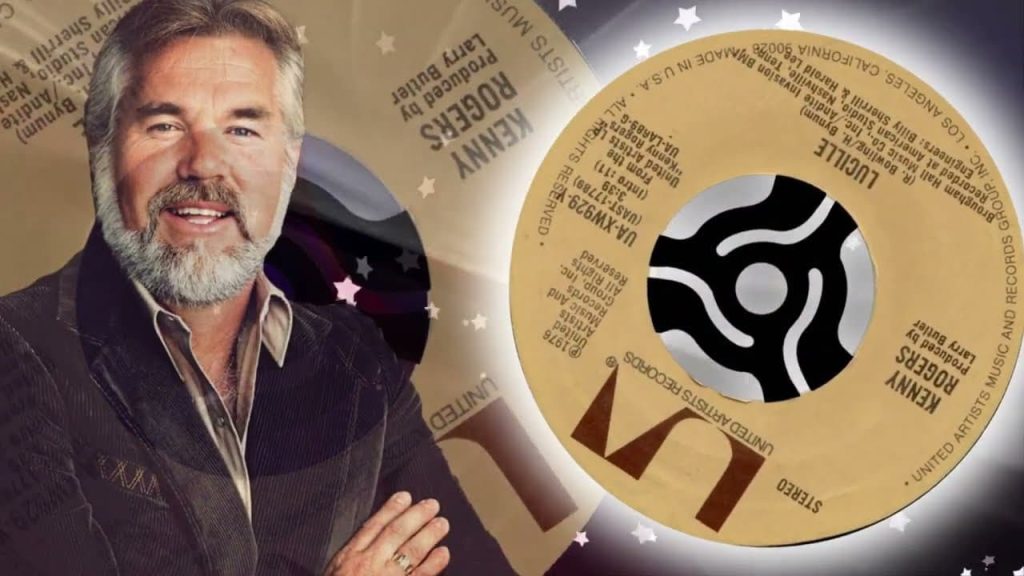
Kenny Rogers – Lucille: A Heartbreaking Tale of Loss and Longing
Few songs in country music resonate with the emotional immediacy of Kenny Rogers’ Lucille. Released in January 1977, this melancholic ballad, penned by Roger Bowling and Hal Bynum, propelled Rogers into the limelight as a solo artist, marking a pivotal moment in his career. Its haunting narrative, coupled with Rogers’ evocative performance, secured its place as one of the most iconic songs of the 1970s, winning him a Grammy Award and international acclaim.
The story in Lucille unfolds with poignant simplicity: a man sits in a bar when he encounters a woman with a weary, almost defeated air. Her opening declaration—“You picked a fine time to leave me, Lucille, with four hungry children and a crop in the field”—is unforgettable. This line, stark and raw, encapsulates the profound betrayal and heartbreak that drive the song’s narrative. It places the listener immediately into the man’s desolation, grappling with abandonment at a moment of profound vulnerability.
The brilliance of Lucille lies not only in its storytelling but in its ambiguity. The woman’s reasons for leaving are left unexplored, making her decision seem simultaneously cruel and tragic. She is painted not as a villain but as a complex figure, someone whose actions have irrevocably altered lives but who remains a human being with her own struggles. This emotional grayness lends the song a richness that resonates with anyone who has experienced the complexities of relationships.
Musically, Lucille is understated, allowing Rogers’ voice to take center stage. His delivery is both tender and aching, imbuing the lyrics with a sense of lived-in pain. The arrangement, with its steady rhythm and mournful piano lines, mirrors the inevitability of the situation, as if the song’s world keeps turning even as its characters are irrevocably broken.
The song’s chorus—“You picked a fine time to leave me, Lucille”—is not merely a lament but a refrain of disbelief. Each repetition feels like an attempt to comprehend the enormity of the situation, underscoring the emotional weight of the man’s predicament. Rogers’ vocal dynamics elevate the song from a simple narrative to a deeply personal confession, making the listener feel as though they are witnessing a private moment of despair.
Lucille’s success was not confined to the United States, where it topped the Billboard Country chart and reached No. 5 on the Hot 100. Its universal themes of heartbreak and resilience resonated globally, earning Rogers his first UK No. 1 single in June 1977. The song’s reception overseas was a testament to the universality of its themes, transcending cultural and geographical boundaries.
The song’s accolades, including Rogers’ Grammy for Best Male Country Vocal Performance, were well-earned. More than just a hit, Lucille was a statement piece, proving Rogers’ ability to embody a song’s narrative with authenticity and emotional depth. It was a crucial step in establishing him as one of country music’s most beloved storytellers.
Beyond its chart success, Lucille has endured as a cultural touchstone, often cited as one of the greatest country songs of all time. Its influence is evident in the countless covers and tributes it has inspired, and its impact on Rogers’ career cannot be overstated. It showcased his unique ability to blend country storytelling with pop sensibilities, paving the way for a string of timeless hits that followed.
Ultimately, Lucille is a masterclass in storytelling through song. It captures the heartbreak of loss, the pain of betrayal, and the complexity of human relationships with an economy of words and a depth of feeling that few songs achieve. Kenny Rogers’ performance of this timeless ballad remains a shining example of his artistry, a poignant reminder of why his voice and music continue to resonate with audiences around the world.
4o